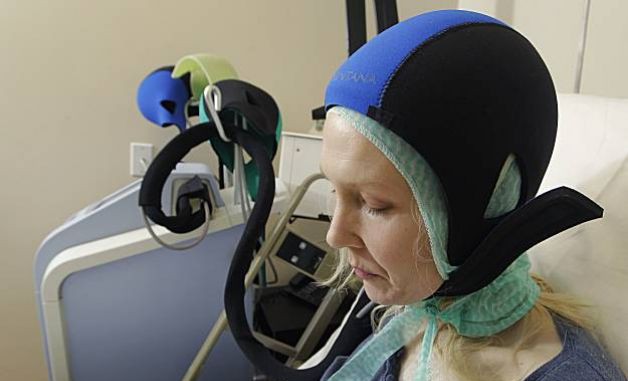
Paxman Coolers, one of the leading manufacturers of scalp-cooling technology, has announced a new partnership aimed at advancing the science on scalp-cooling, which is a promising approach to reducing chemotherapy-induced hair loss.
Cancer suffers who lose their hair as a consequence of chemotherapy will benefit from a major research project that promises to improve the scalp cooling technology that prevents hair loss.
The research is now underway and is being pioneered by global scalp cooling manufacturing company, Paxman Coolers, based in Huddersfield, U.K., in conjunction with the biology department of the University of Huddersfield.
The research project will be led by doctoral student Omar Hussain, who initially joined Paxman’s as a researcher on a joint government-sponsored Knowledge Transfer Partnership between the company and the university designed to establish the scientific basis of scalp cooling and its success rate with different drugs. He was supervised by the University’s Dr. Nik Georgopoulos and Dr. Andrew Collett, with whom he performed preliminary tests of the products’ effectiveness.
Now, an article in the specialist journal Toxicology in Vitro reports on the findings of the project. In the article, Hussain and colleagues summarize the results of lab tests that provide experimental evidence that cooling can markedly reduce the hair loss caused by some of the drugs most commonly used in chemotherapy. This supports the clinical evidence, the researchers note. The team also found that the choice of temperature can be crucial, a new discovery that paves the way for further research.
Chemotherapy-induced hair loss occurs in about 65 percent of patients that receive chemotherapy for cancer treatment, and about 47 percent of female patients believe hair loss is the most distressing part of chemotherapy. Scalp cooling is thought to reduce hair loss by inducing vasoconstriction (narrowing of the blood vessels) and reduction of metabolism. Vasoconstriction leads to reduced blood flow to the hair follicles in the period of peak plasma concentration of the relevant chemotherapy agent. Reduced biochemical activity also makes hair follicles less vulnerable to the damage of chemotherapy agents.
There is a strong evidence base for the use of scalp cooling: a review published in the March 2005 issue of the Annals of Oncology found that, of 53 studies of scalp cooling to prevent hair loss during chemotherapy, success rates were 56 percent prior to 1995 and 73 percent since then.
Cell survival increased with cooler temperatures
Hussain, who has presented his research at several international conferences, described how he replicated the effect of scalp cooling in laboratory conditions. Cells were taken from hair follicles and subjected to a simulation of chemotherapy treatment. Experiments were conducted with different levels of temperature, from 37 degrees C – the normal temperature of the human body – and then lowered. As the temperatures fell, cell survival increased.
“Compared with 37 degrees there are huge differences,” said Omar. “At low temperatures, cells are being rescued and maintained well and this promotes the cooling effect.” He added that the optimum temperature for scalp cooling is yet to be finalized, although it is below 22 degrees C.
A patient wears a scalp cooler for 30 minutes before chemotherapy, continues to wear it during treatment and for 90 minutes afterwards. As part of his research, Hussain tested the response of more than 50 people – Paxman staff plus University staff and students – to wearing the device. “The first ten minutes are when everybody feels a slight discomfort. After that they are fine,” he said.
Based on the promising results from this preliminary research, Paxman plans to launch a fourth generation scalp cooler in 2016. Although acceptance of scalp cooling technology was initially slow during the early years of development, the team says sales have grown by at least 20 percent annually for the past five years and are expected to accelerate further.
“When a patient comes to us and asks what the chances are of keeping their hair, at the moment we are very fair and say they are 50 percent,” said Richard Paxman, Managing Director of Paxman’s. “Now we want to take that up to 80 percent and we believe that greater understanding of the scientific mechanisms will allow us to do that.”
